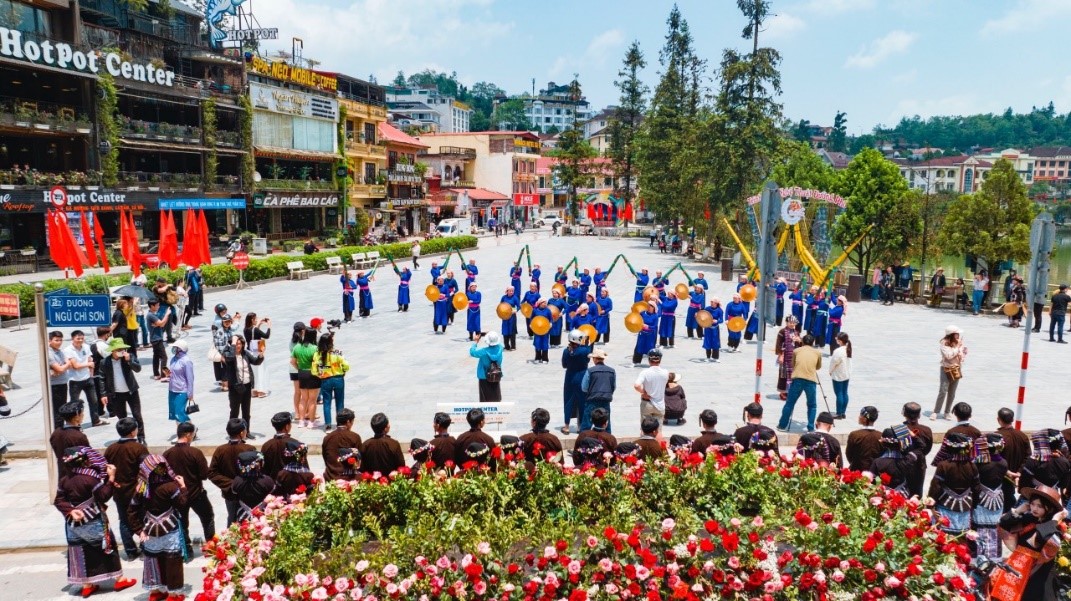
Festival celebrating 120 years of Sa Pa tourism . Photo: Xuan Quynh
Join us on a journey to explore Lao Cai to gain a deeper understanding of the unique cultural identity of the ethnic living and preserving their heritage in this region. Exploring the cultural diversity of Lao Cai's ethnic groups In Lao Cai, the scattered ethnic villages on hillsides and in lush valleys await travelers with the majestic beauty of nature and distinctive cultural identity. From wooden houses with thatched roofs to intricate hand-embroidered tapestries, from flavorful traditional feasts to solemn festivals, each is a unique beauty of each ethnic group, each village.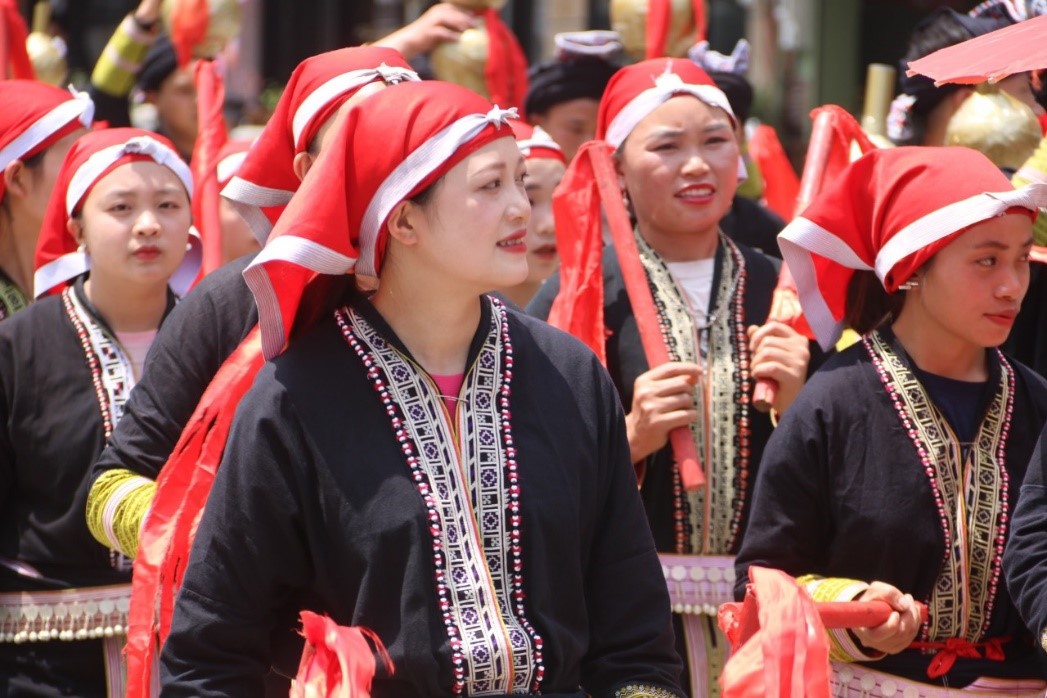 Stepping into Lao Cai, travelers are like stepping into a vivid history book, where each page is adorned with the stories, traditions, and souls of the local ethnic people. It's the harmonious blend of nature and humanity, of modernity and tradition, creating a unique and impressive tourist space in Lao Cai. Visiting ethnic villages Traveling to Lao Cai to visit ethnic villages is a colorful journey full of unique experiences. This journey helps you discover and understand the diverse cultural identity of the ethnic living in the northwest region of Vietnam. Some unique points when visiting ethnic villages in Lao Cai: Sapa Village : Located about 38 km from the center of Lao Cai city, Sapa is a famous destination not only for its stunning natural scenery but also for its ethnic diversity and culture. Here, you have the opportunity to interact with ethnic groups such as H'Mong, Dao Do, Tay, Xa Pho, and Giay. Through visiting these charming small villages, you can learn about the way of life, traditions, customs, and the art of embroidery of each ethnic group. Ta Van and Lao Chai Villages : These are two villages located near the town of Sapa, where a large number of H'Mong people live. Lao Chai is famous for its terraced fields, while Ta Van boasts picturesque scenery along the green stream. What's unique is that you can experience daily life with the host family, participate in their activities, and learn about their unique cultural heritage.
Stepping into Lao Cai, travelers are like stepping into a vivid history book, where each page is adorned with the stories, traditions, and souls of the local ethnic people. It's the harmonious blend of nature and humanity, of modernity and tradition, creating a unique and impressive tourist space in Lao Cai. Visiting ethnic villages Traveling to Lao Cai to visit ethnic villages is a colorful journey full of unique experiences. This journey helps you discover and understand the diverse cultural identity of the ethnic living in the northwest region of Vietnam. Some unique points when visiting ethnic villages in Lao Cai: Sapa Village : Located about 38 km from the center of Lao Cai city, Sapa is a famous destination not only for its stunning natural scenery but also for its ethnic diversity and culture. Here, you have the opportunity to interact with ethnic groups such as H'Mong, Dao Do, Tay, Xa Pho, and Giay. Through visiting these charming small villages, you can learn about the way of life, traditions, customs, and the art of embroidery of each ethnic group. Ta Van and Lao Chai Villages : These are two villages located near the town of Sapa, where a large number of H'Mong people live. Lao Chai is famous for its terraced fields, while Ta Van boasts picturesque scenery along the green stream. What's unique is that you can experience daily life with the host family, participate in their activities, and learn about their unique cultural heritage. 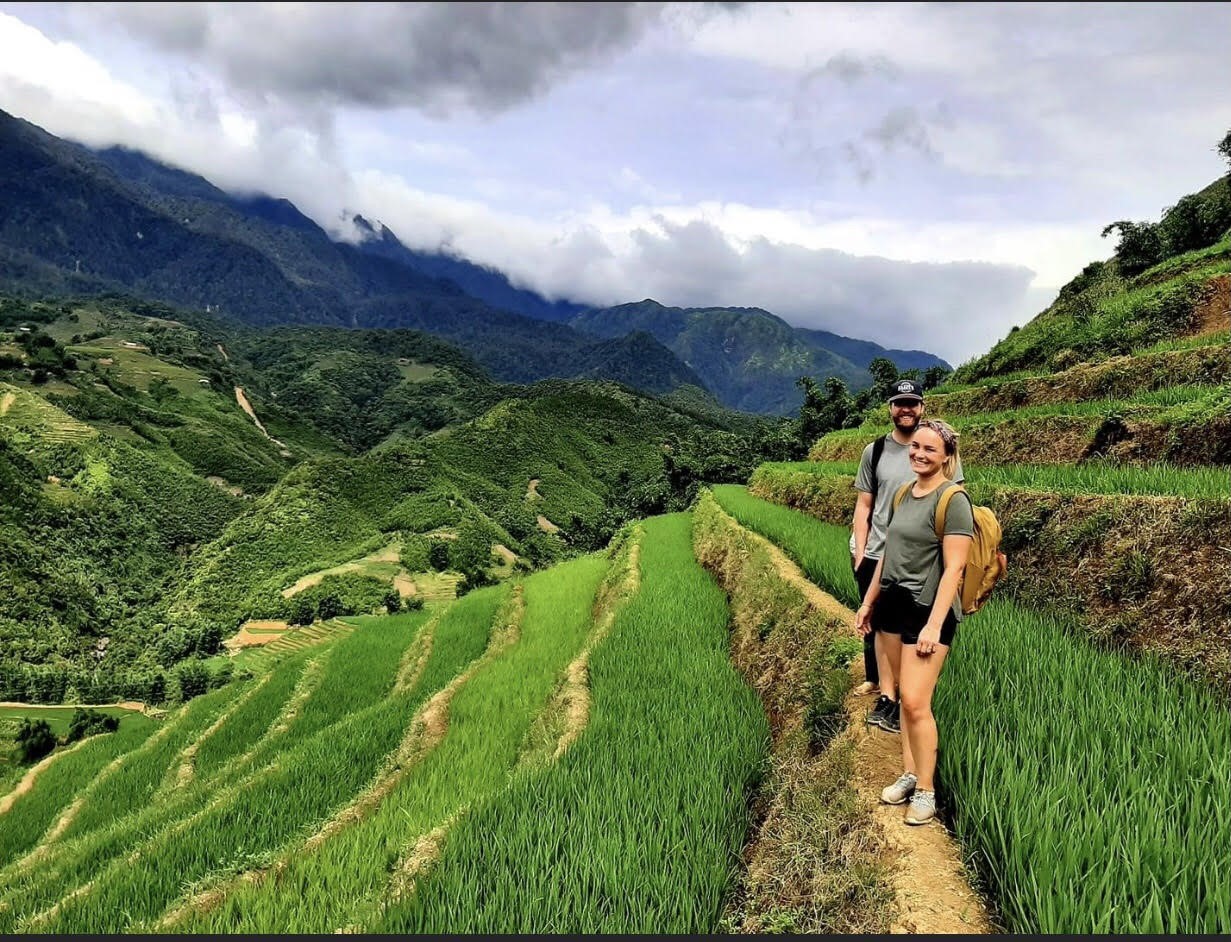
Foreign tourists visit Ta Van village. Photo: dulichlaocai.vn
Cat Cat Village : Located not far from the center of Sa Pa, Cat Cat Village is an interesting stop and not unfamiliar to tourists. Here, you can visit traditional H'Mong houses, learn about the dyeing process from leaves, and the intricate art of embroidery.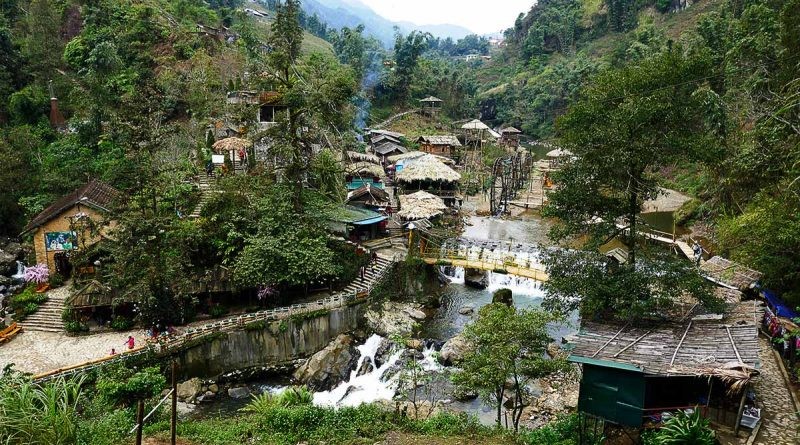
Cat Cat village very beautiful in rainy saison. Photo: Internet
Lao Cai and Pho Rang Villages : These are villages of the Dao Do and Tay ethnic groups. Here, you have the opportunity to participate in fun activities such as walking with villagers, trying on traditional costumes, and even joining traditional cooking classes. Sin Chai Village : This is the village of the Mong people, also known as the "cloud convergence." You can enjoy the peaceful space, visit the lush green fields, and immerse yourself in the simple life of the village.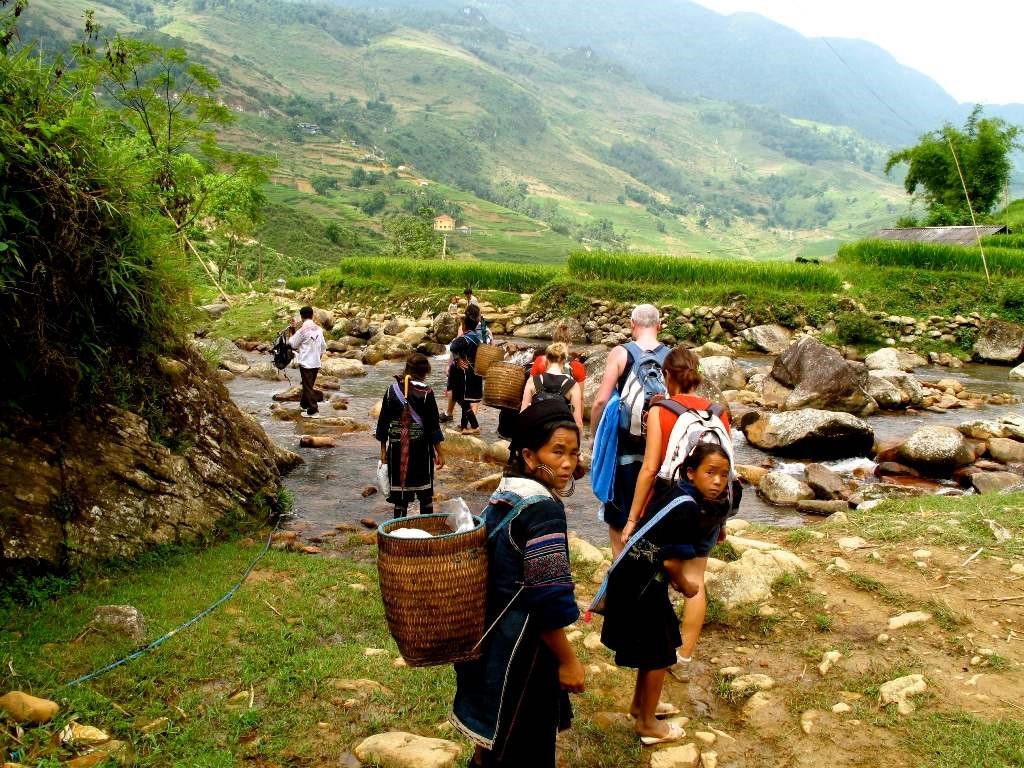 Participating in traditional festivals Participating in traditional festivals when traveling to Lao Cai is a great way to immerse yourself in the unique cultural space of the ethnic region. Visitors from afar will experience the life of the community and enjoy colorful and joyful moments. Some traditional festivals you can participate while visiting Lao Cai:
Participating in traditional festivals Participating in traditional festivals when traveling to Lao Cai is a great way to immerse yourself in the unique cultural space of the ethnic region. Visitors from afar will experience the life of the community and enjoy colorful and joyful moments. Some traditional festivals you can participate while visiting Lao Cai: 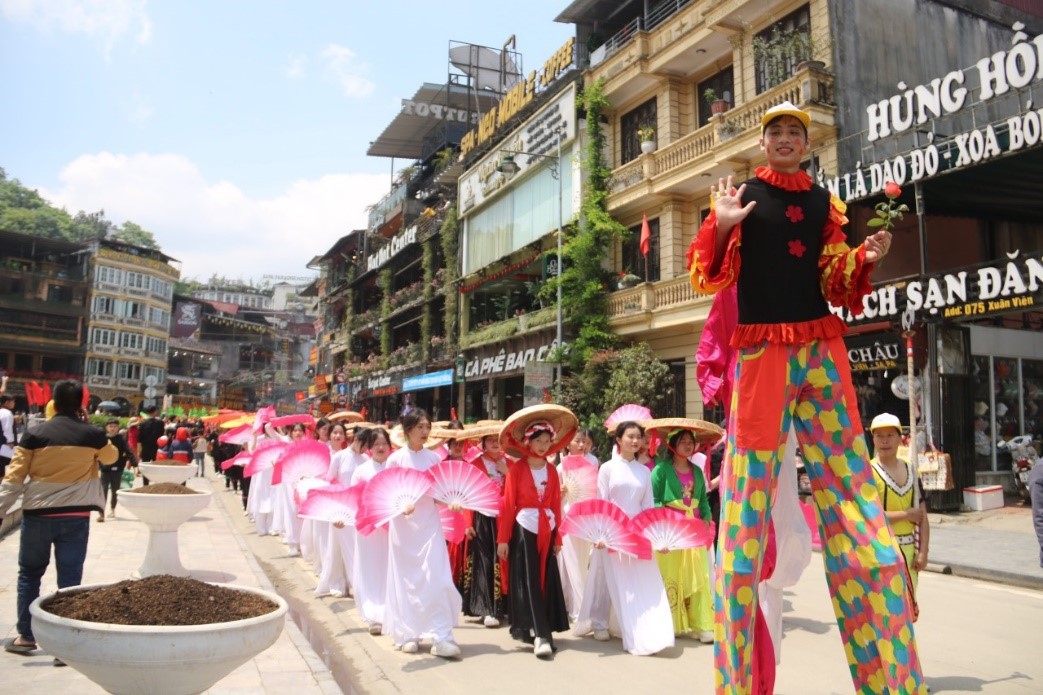
Photo: Xuan Quynh
New rice season Festival : This is one of the important and popular festivals in the villages of Lao Cai. The New Rice Season Festival usually takes place in July or August (lunar calendar) every year when people start harvesting rice. You can participate in traditional activities such as rice cutting, meeting and sharing meals with host families, and joining folk dances and songs. Dao Do bathing Festival : This festival usually takes place in early January (lunar calendar) every year. The Dao Do people hold the festival to cleanse all the bad things of the old year, prepare for the new year. You can join the locals in the festival, bathe in the streams, enjoy traditional cuisine, and participate in folk games.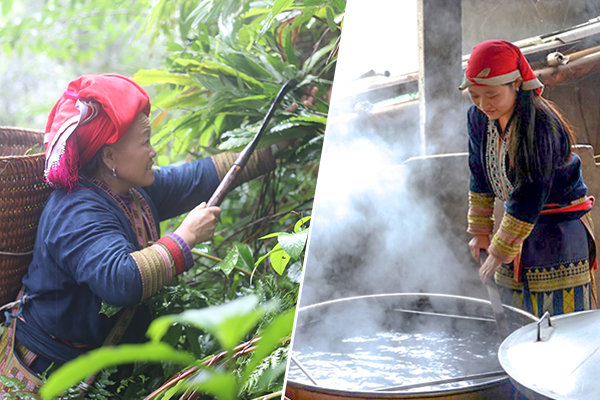
Photo: suckhoedoisong.vn
H'Mong ripening rice Festival : This festival usually takes place around September or October (lunar calendar) every year when the rice ripens on the fields. The H'Mong people organize the festival to thank the earth god and wish for a bountiful harvest season. You can participate in activities such as dancing, sheep jumping, and testing strength with traditional games.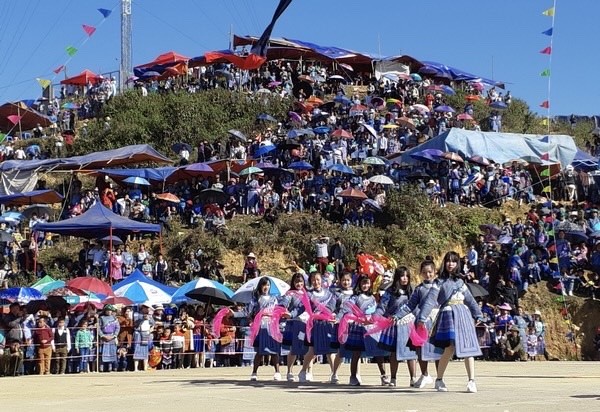
Photo: baolaocai.vn
Cau Mua Festival : Taking place at the end of February or the beginning of March (lunar calendar), the Cau Mua Festival of the Tay people is an important cultural event. The festival honors the sacred spirit of the Cau Mua with solemn activities, processes, and entertainment. Enjoying local cuisine Traveling to Lao Cai to deeply understand the local culture must involve enjoying local cuisine. This is a great opportunity for you to explore and enjoy the unique dishes of the ethnic regions in Lao Cai. Some dishes you shouldn't miss: Bamboo-tube rice : This is a popular dish of the ethnic groups in the mountainous areas of Lao Cai. Rice is wrapped in banana leaves, then cooked over charcoal or firewood. Bamboo-tube rice is usually served with pork, chicken, or fish.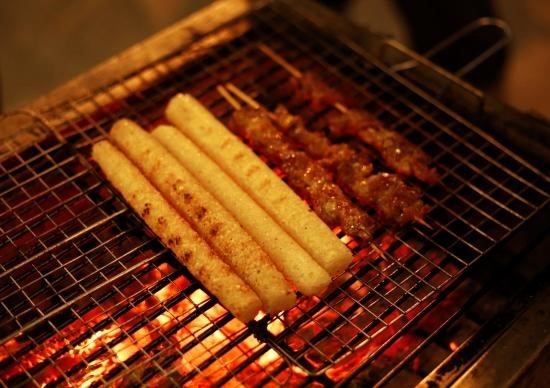
Photo: doingoailaocai.vn
Thang Co : This is a traditional specialty of the H'mong people, originating from Yunnan. Traditionally, it's made with horse meat, and all parts such as heart, liver, lungs, bile, meat... are cooked together. It's stewed with 12 types of mountain herbs such as cardamom, cinnamon, and cloves. This dish is usually enjoyed in winter or on cool autumn days. Muong Khuong Pork : This is a specialty dish of the H'Mong people in Muong Khuong. The pork is grilled over charcoal, very tender, fragrant, and has a distinctive aroma. Besides grilling, you can also enjoy stir-fried pork or steamed pork. Tao meo Wine : Tao meo wine is a traditional drink of the H'Mong people. It has a unique flavor and is an important part of traditional festivals.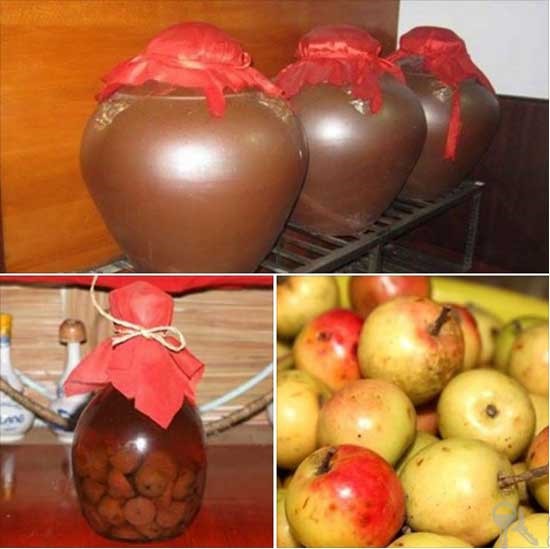
I'm talking about Wine. Photo: Kinhnghiemdulich.vn
Duong Lam Sticky Rice Cake : Sticky rice cake is a traditional dish of the Dao people, usually made from sticky rice and green beans. In Lao Cai, Duong Lam is famous for its delicious and mouthwatering sticky rice cakes. When enjoying local cuisine in Lao Cai, you not only experience excellent flavors but also learn more about the culinary style and life of the local ethnic escapes. Enjoy the interesting experiences and explore unique and delicious dishes on your travel journey. Visiting spiritual tourism sites Lao Cai is not only famous for its majestic natural beauty and diverse ethnic cultures but also has meaningful spiritual destinations. Some spiritual destinations in Lao Cai that you can visit: Tam Dao Pagoda (Hoa Nghiem Pagoda): Tam Dao Pagoda is an ancient pagoda located on the summit of a mountain named "Tam Dao" in Bat Xat district. This is a sacred place harmonizing with nature, where travelers can learn about Buddhism and relax in peaceful surroundings. Van Son Quan Am Pagoda: Located in Sa Pa town, Van Son Quan Am Pagoda is a small temple but with great spiritual significance. The temple has a 12-meter-high statue of Quan Am Bodhisattva, a symbol of love and compassion. Stone Church : This is a unique spiritual work built from natural stone, with interesting and eye-catching architecture. The church has become one of the landmarks in Sapa - Lao Cai. Temple of Ho (Sac Da Temple): Temple of Ho is located in Nam Luc commune, Muong Khuong district. This is a sacred temple of the Mong people, where they worship the holy spirit Sac Da, an important deity in Mong religion. Muong Vi Stone Church : Located in Muong Vi district, Muong Vi Stone Church is a masterpiece of spiritual architecture built by the local people. This is also a place of worship and gathering for the Mong people. Visiting spiritual destinations in Lao Cai not only helps you understand the religious culture of the local people but also brings spiritual experiences and peace in your travel journey./.Text: Q.Lien




![[Photo] Phu Quoc: Propagating IUU prevention and control to the people](https://vphoto.vietnam.vn/thumb/1200x675/vietnam/resource/IMAGE/2025/8/24/f32e51cca8bf4ebc9899accf59353d90)

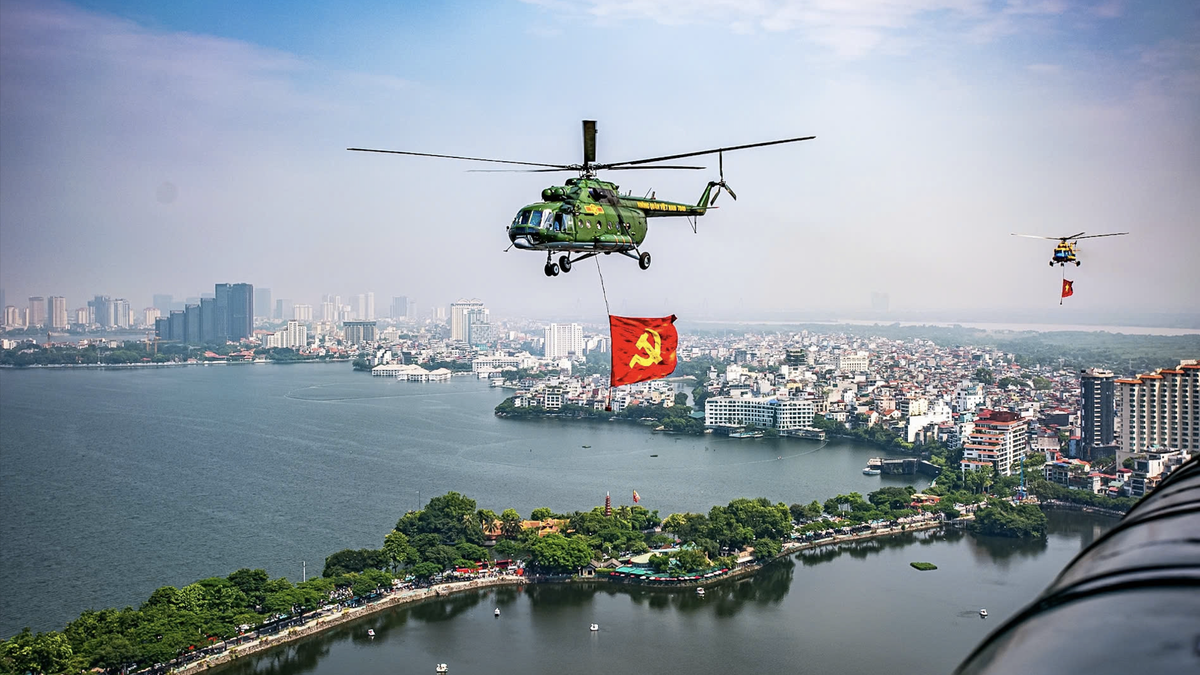

![[Photo] Party and State leaders meet with representatives of all walks of life](https://vphoto.vietnam.vn/thumb/1200x675/vietnam/resource/IMAGE/2025/8/24/66adc175d6ec402d90093f0a6764225b)
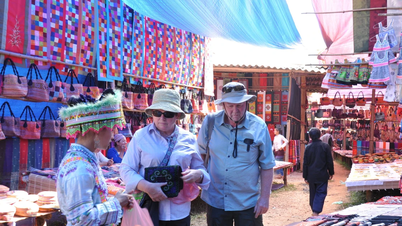

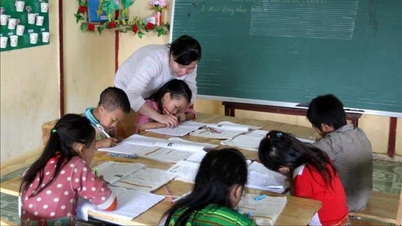

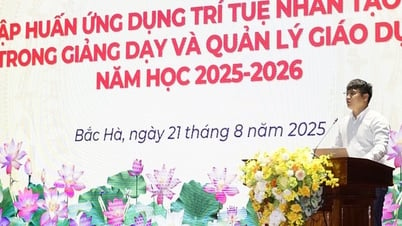

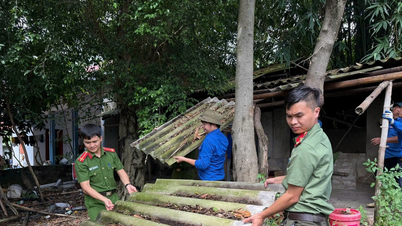

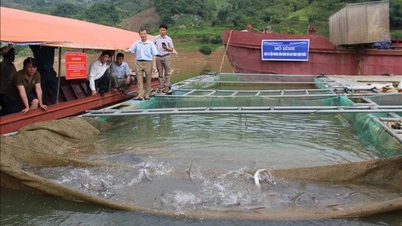



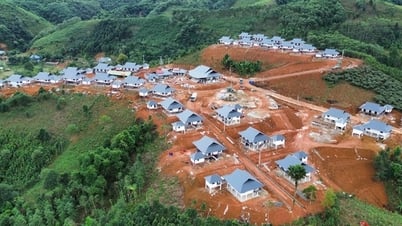
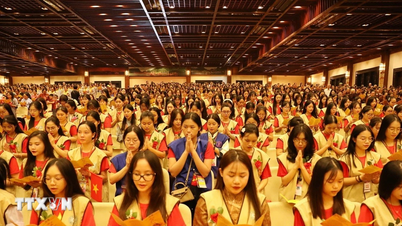

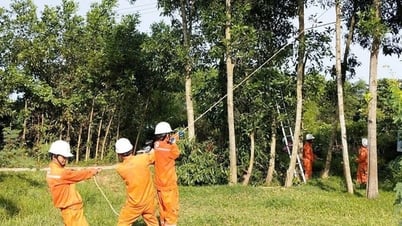







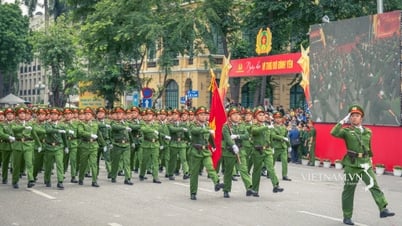
































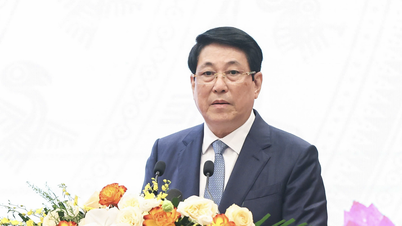













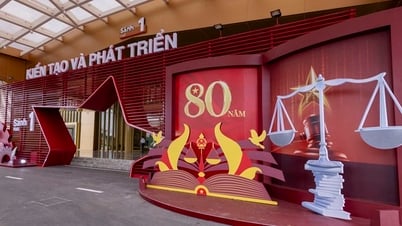






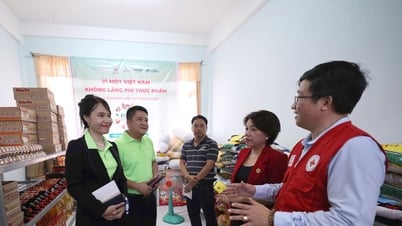


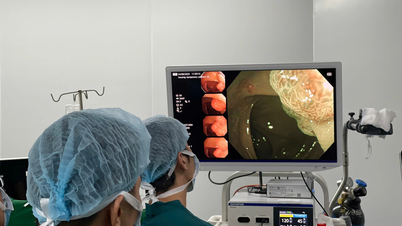












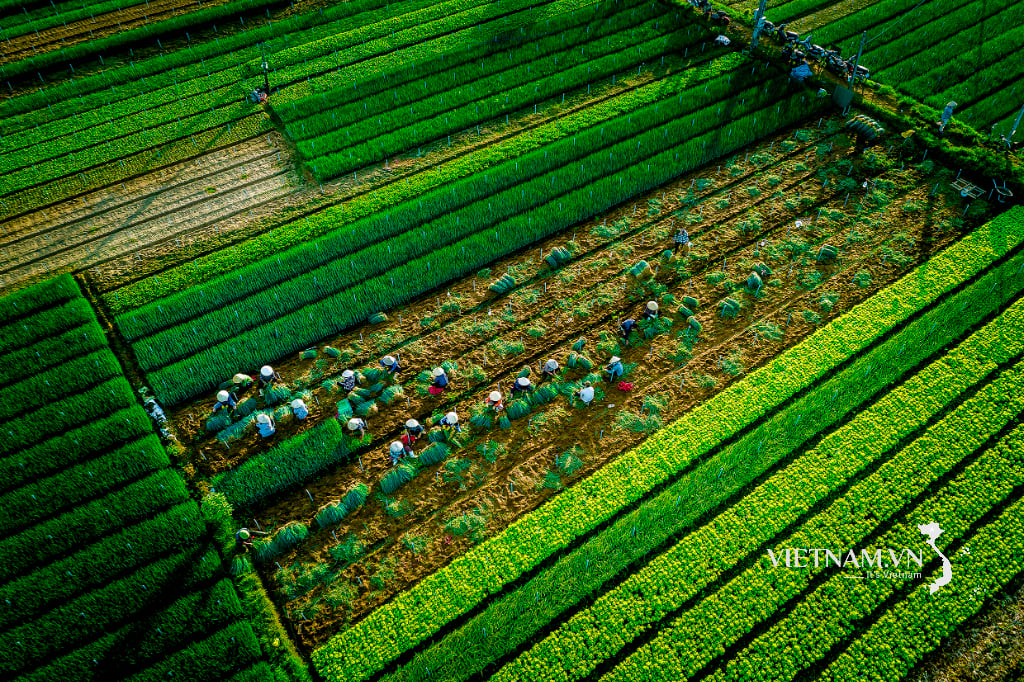

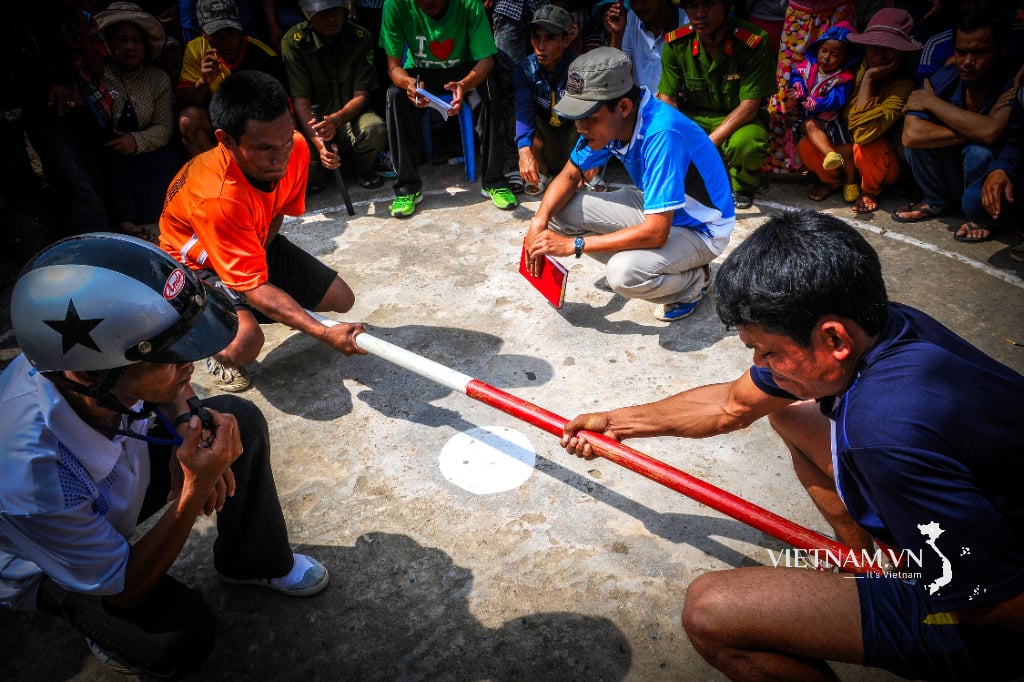

Comment (0)